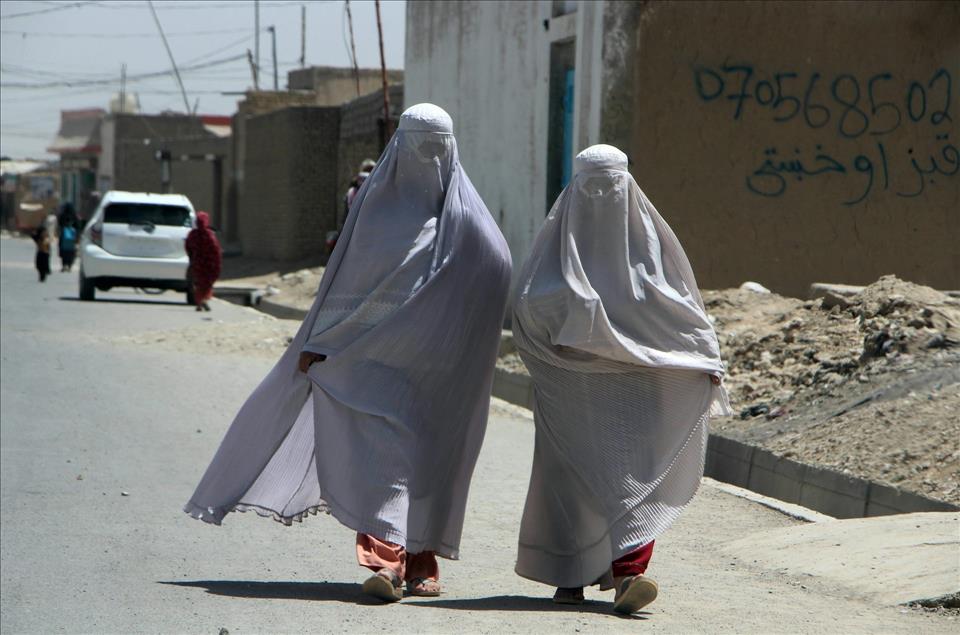
The Taliban's Harsh New 'Vice And Virtue' Laws Are A Throwback To The Oppression Of The 1990S Especially For The Women Of Afghanistan
This time, they hoped, a more sophisticated and pragmatic vision might have replaced the Taliban's previously extremist approach.
Some also argued that the rest of the world had a moral responsibility to approach Afghanistan's new rulers with cautious optimism. Engagement should be the key . Anything else risked condemning the country and its population to isolation and economic hardship.
Others weren't convinced .
During the negotiations that led to the February 2020 Doha agreement , the Taliban's position on post-settlement Afghanistan's politics remained ambiguous. The group continued this vague posture during the subsequent intra-Afghan dialogues with the former Afghan government.
Then, appearing in a press conference three days after Taliban forces took control of Kabul, its spokesman Zabihullah Mujahid, appeared to give reassurances the new regime would respect women's rights“within the norms of Islamic law”.
In the ensuing three years, the Taliban's fundamentalist regime has continued to suffer from weak legitimacy , despite taking pains initially to cultivate a conciliatory image compared to its harsh rule in the 1990s.
However, what had appeared to some be Taliban 2.0 has increasingly looked like the old, harsh and fundamentalist Taliban as the regime has grown more confident in its hold on power.
Since 2021, Hibatullah Akhundzada, the leader of Afghanistan's Islamic Emirate, has gradually issued more than 50 decrees that affect most areas of society.
Many hard-won achievements under the former republic, such as freedom of expression and the press, have been suppressed . The regime has forced into disappearance, imprisoned or murdered many former government members, despite announcing a general amnesty.
In their treatment of women, including forbidding education after the age of 12, restrictions have become so harsh that the resulting subjugation has been labelled “gender apartheid” by many journalists, academics and activists.
Many female students have had to flee the country. Most recently a group of women medical students made the news after they were granted scholarships to go to UK to complete their studies.
The regime has also revived public executions and flogging reminiscent of their 1990s practices. An edict issued in March 2024 stated the regime will also resume public stoning.
The regime has now introduced a series of new“vice and virtue” laws , to be enforced by the Ministry for the Propagation of Virtue and Prevention of Vice (PVPV).
Until now, government has been mainly by decrees from the Taliban leadership. But these, while giving an indication of the regime's increasingly extremist and authoritarian nature, have not been accompanied with details of how they should be enforced. This uncertainty could, at times, allow local authorities a degree of leeway, including the ability in some cases to ignore decrees when it suits.
But the recent law chnage removes these ambiguities, empowers the Taliban's morality police and is enforceable on everyone residing in Afghanistan.
Blueprint for oppressionThe new laws are particularly harsh on women. They enforce the wearing of the hijab and stipulate this garment must be made of thick enough material to fully cover a woman's face and body and avoid offering temptation to men.
Women's voices are also deemed to be a source of temptation, so women are now not allowed to speak outside the family home. If a woman can be heard singing, even from within her own home, this is considered a violation of the law and can be punished. Women are even forbidden from looking directly at a man who is not their husband or blood relative.
Enforcement can be undertaken by anyone in society“who is capable”. Reports by two“trustworthy” individuals is enough to bring a prosecution. This is a worrying prospect, as it could lead to arbitrary accusations based on personal or political vendettas.
Officially enforcement will be carried out by the ministry's appointees, the morality police or mohtaseb.“Fairness and kindness” are stipulated as guiding principles for how the new rules should be enforced, although these terms are not defined and the law is replete with subjective terminologies open to interpretation by those enforcing them.
Defiant: Taliban spokesman Zabiullah Mujahid says western concerns over the regime's treatment of women are due to 'cultural differences'. EPA-EFE/Samiullah Popal
New media laws introduced as part of the package prohibit“un-Islamic content” and empower the morality police to compel media officials to prevent the publication of content deemed contrary to Sharia and images of living beings. This last measure will effectively throw into doubt the future of TV broadcasting in Afghanistan.
The laws also forbid music in public and“un-Islamic” hairstyles. Men must grow beards at least as long as a fist. As a worrying sign for continued humanitarian engagement involving non-Muslim foreign workers, the law prohibits befriending, helping or imitating“nonbelievers”.
Violations will be met with on the spot fines issued by the mohtaseb or imprisonment for one-to-three days and prosecution in the regime's courts for repeat offenders. The morality police also has the power to compel attendance at the mosque, with prosecution for those who do not obey, regardless of whether they pray at home.
As recently as June, Taliban representatives attended UN-sponsored talks in Doha at which spokesman Zabihullah Mujahid called for funds frozen by the west to be released and for the relaxation of sanctions on the regime. He dismissed western concerns over the regime's treatment of women as“cultural differences”.
But these new laws have effectively removed any remaining differences between the current regime and its 1990s predecessor, a fundamentalist pariah that turned Afghanistan into an isolated outcast.

Legal Disclaimer:
MENAFN provides the
information “as is” without warranty of any kind. We do not accept
any responsibility or liability for the accuracy, content, images,
videos, licenses, completeness, legality, or reliability of the information
contained in this article. If you have any complaints or copyright
issues related to this article, kindly contact the provider above.


















Comments
No comment